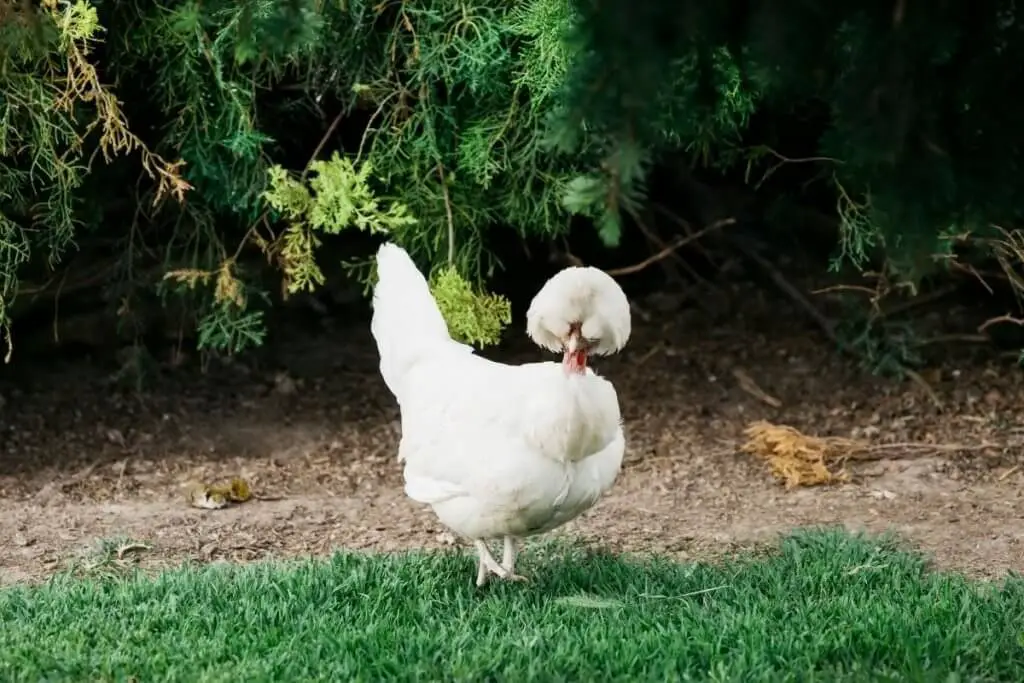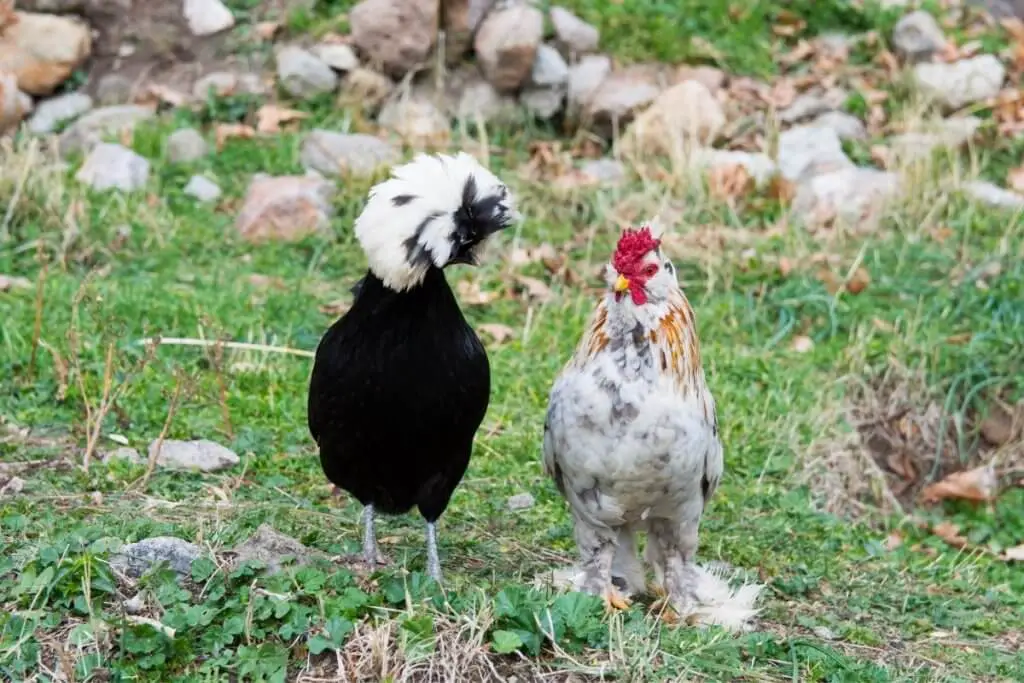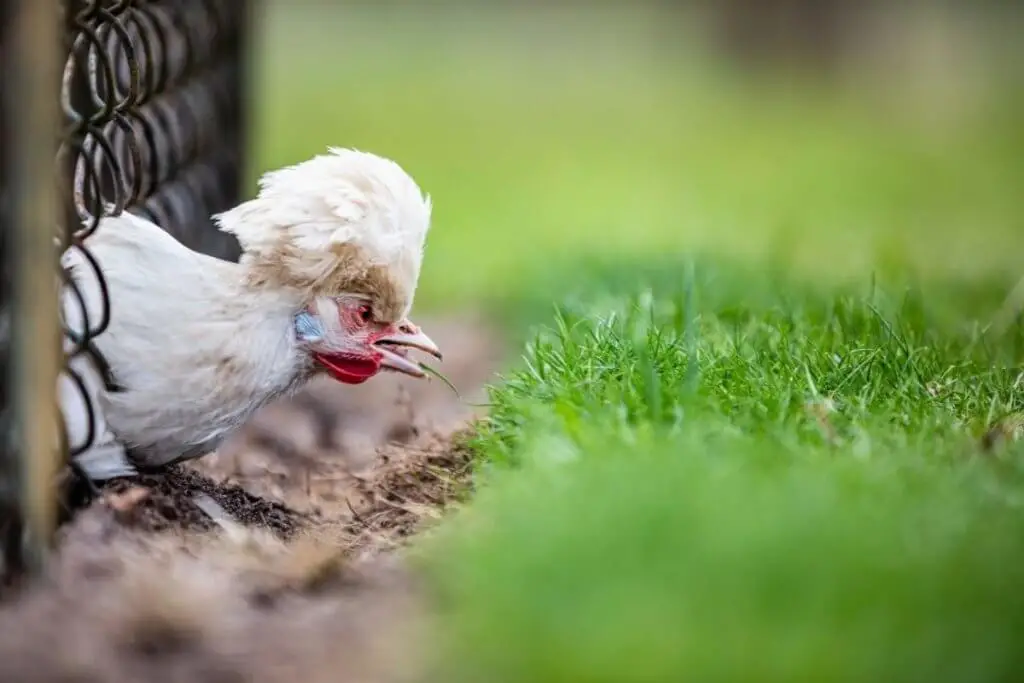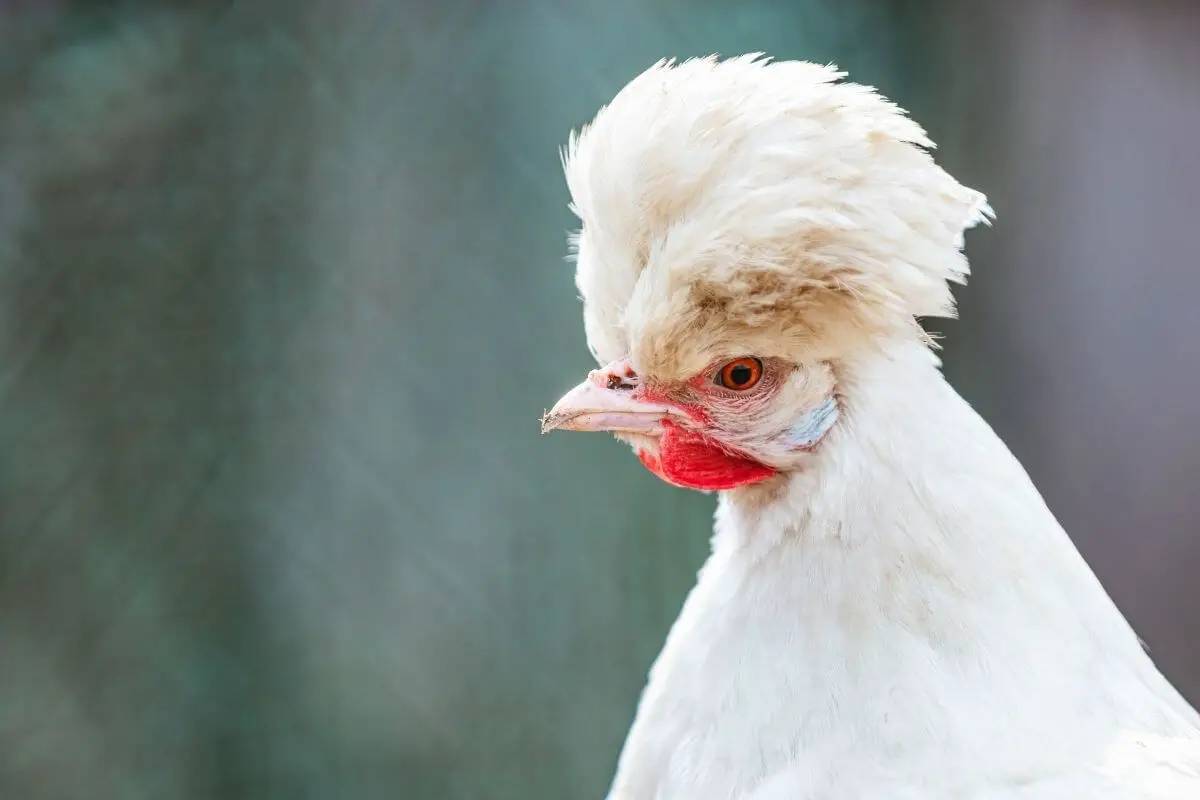Sultan Chickens are ornamental birds that lay beautiful white eggs. These chickens are quite rare to find and they only lay around 50 eggs per year, while only growing 4 to 6 pounds.
Sultan chickens are one of the most beautiful chickens around. When you see one, you definitely know it’s a Sultan.
The Sultan is also one of the rarest and oldest poultry breeds out there.
Whether you’re interested in keeping Sultan chickens or are just curious to know if it’s the right breed for you, here’s everything you need to know about this remarkable breed, including its history, appearance, temperament, and care requirements.
Table of Contents
Sultan Chicken Breed Overview
| Name | Sultan |
| Origin | Turkey |
| Primary Purpose | Ornamental |
| Varieties | White, Black, Blue |
| Weight | Male: 5 to 6 Pounds; Female 4 Pounds |
| Lifespan | 5 to 8 Years |
| Egg Size | Small |
| Egg Color | White |
| Egg Production | 1 per week |
| Meat Production | Poor |
| Broodiness | Low |
| Comb Type | Duplex |
| Ideal Climate | Warm or Hot and Dry |
| Maintenance | High |
| Predator-Savvy | No |
| Excellent Forager | No |
| Tolerance to Confinement | Yes |
| Temperament | Calm and Docile |
| Noise Levels | Moderate to High |
| Aggressive Toward Other Flock Members | No |
| American Poultry Association Recognized | Yes |
The History of Sultan Chickens
This ornamental chicken breed hails from Turkey. The breed made its way to England in 1854 when Elizabeth Watts carried some birds with her to London.
Sultans arrived in the United States in 1867 and seven years later, they were recognized by the National Poultry Association.
Sultans come in three distinct color varieties: white, black, and blue. The white sultan is the most common variety.
What Does a Sultan Chicken Look Like?

Being an ornamental breed, Sultans are very unique. They have the following major physical characteristics:
• 5 toes instead of 4 toes
• Feathered feet and legs
• Large crests
• Low-lying wings that hide the upper hocks and thighs
• Tiny, bright earlobes
• Trilobed beards
• V-shaped combs (otherwise known as horn combs or devils combs)
• Wide nostrils
How Big Does A Sultan Chicken Get?
Sultan chickens are not very large birds, so they are not ideal for meat production and even when fully grown, can sometimes be mistaken for a pullet.
A full-grown Sultan hen weighs about 4 pounds while a Sultan rooster weighs around 6 pounds at maturity.
Sultan Chicken Temperament and Personality
Sultans are calm, docile, and friendly birds. They are also easy to raise and control. This makes them a great choice as show or backyard pets.

Sultans don’t do well in cold climates and they are not good at foraging. However, they do well in warmer or hotter temperatures and tolerate confinement quite well.
Another thing to note about Sultans is that they are good at flying, so it’s important to keep them in a fenced yard.
They get along well with other flock members and they get attached to their keepers.
Egg Production
Sultan chickens are certainly one of the worst breeds of chicken for egg production, laying about 1 egg per week on average
So if you’re looking for reliable egg layers, consider getting a different breed like Leghorns or Barred Rocks.
Meat Production
Due to their small size, Sultans are also not ideal for meat production.
So if you’re looking for reliable meat producers, consider getting dual-purpose chicken breeds such as Orpingtons or Brahmas.
Are sultan chickens Noisy?
Yes. Sultan chickens are chatty birds. Although they may not be very loud, they talk constantly.
Caring For Your Sultan Chickens
Apart from the normal chicken care requirements, Sultans don’t have many breed-specific needs.
Before buying Sultan chickens, consider their needs:
1. Housing
You will need to ensure your Sultans have good housing including a grassy place where they can play, run, and roam around. Make sure the space is large enough for all chickens. You can either buy a commercially-made coop or build one yourself.
It’s also important to provide them with clean and dry bedding to ensure they are clean and healthy. Plus, you need to have a reasonably-sized fence since Sultans tend to be flighty.
2. Feeding and Diet
Sultans are easy to feed because they do well with standard rations and occasional chicken treats.
Sultan chicks need a high-quality chick starter until they reach around 16 to 18 weeks old.
Egg-laying Sultan hens will need a complete feed that is ideal for standard laying hens.
3. Protection from predators
You should also keep your Sultans safe from predators like raccoons and foxes. You need to watch out for any animals near your birds and ensure you know the type of predators in your area. That way, you can take the necessary measures to keep your chickens safe and comfortable.
4. Health Issues
Sultans are relatively healthy chickens with a lifespan of around 5 to 8 years. One thing you need to do regularly is to ensure their leg and foot feathers are always clean to lower the risk of bacterial infections.
As with other breeds, you should also watch out for lice, mites, and different kinds of infections in your Sultan chickens. If any bird is behaving abnormally or is having abnormal discharge or droppings, call your vet doctor as soon as possible.
Keep your chicken coops clean to help prevent most of these health issues. Lastly, keep an eye on your birds to detect any health problems before they escalate.
5. Optional Supplies
Last but not least, you may want to buy different accessories to help make your Sultan chickens happier and more comfortable.
You may not necessarily use all accessories, but they may come in handy at some point. Here are some of the most recommended products:
• Hay Pods
• Heated perches
• Heated water-bowls
• Heating pads
• Treat containers
Are Sultan Chickens Right For You?
Sultan chickens are extremely rare, so they are not commonly used for consumption. They are normally kept as pets or fancy backyard birds and can tolerate confinement well.

They are quite easy to care for and they have a great personality to match their beautiful appearance. Plus, there are few health issues associated with this breed.
One downside of these chickens is that they are prone to bullying due to their small size, calm personality, and infrequent breeding.
So before adding Sultan chickens to your home and flock, make sure to consider their pros and cons. This is assuming you can find one as sourcing reliable breeders and a hatchery still remain quite difficult in 2022.

